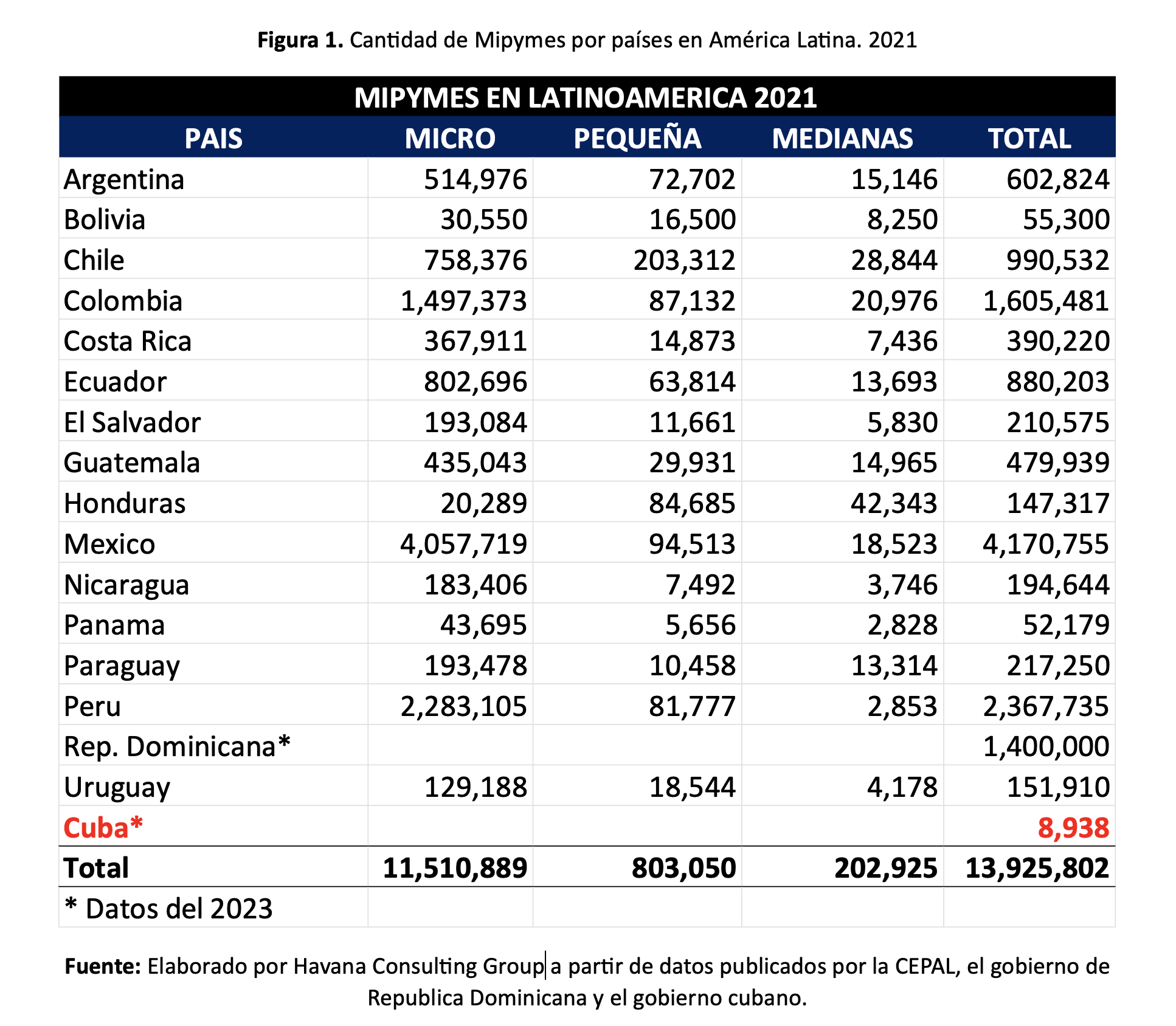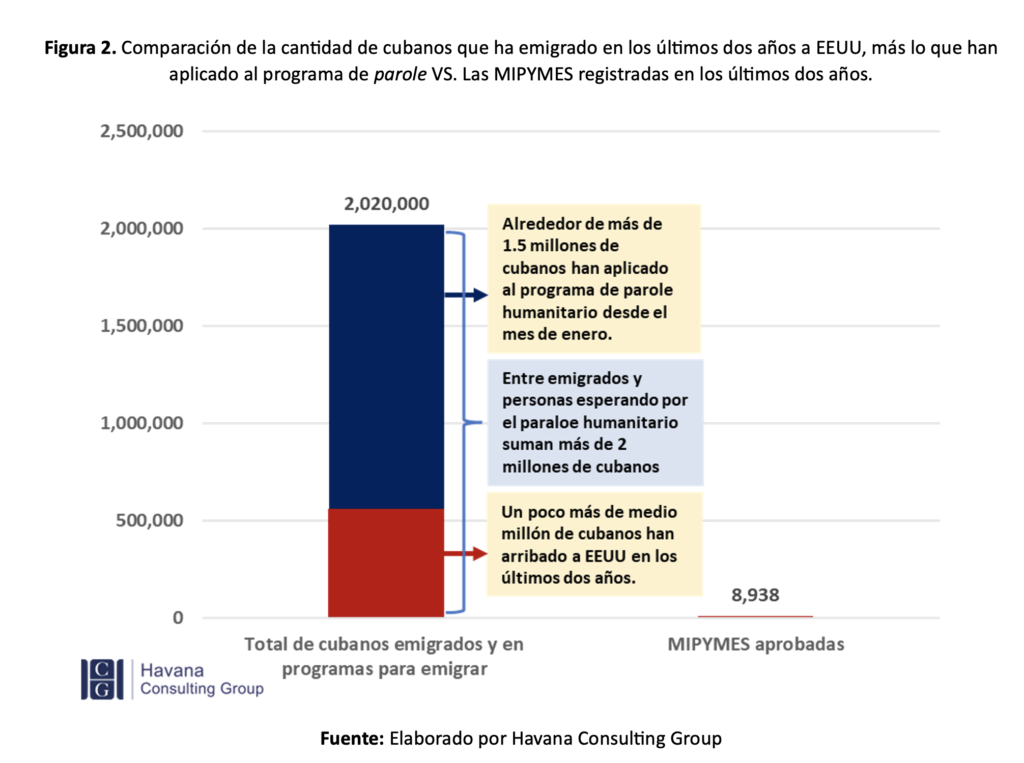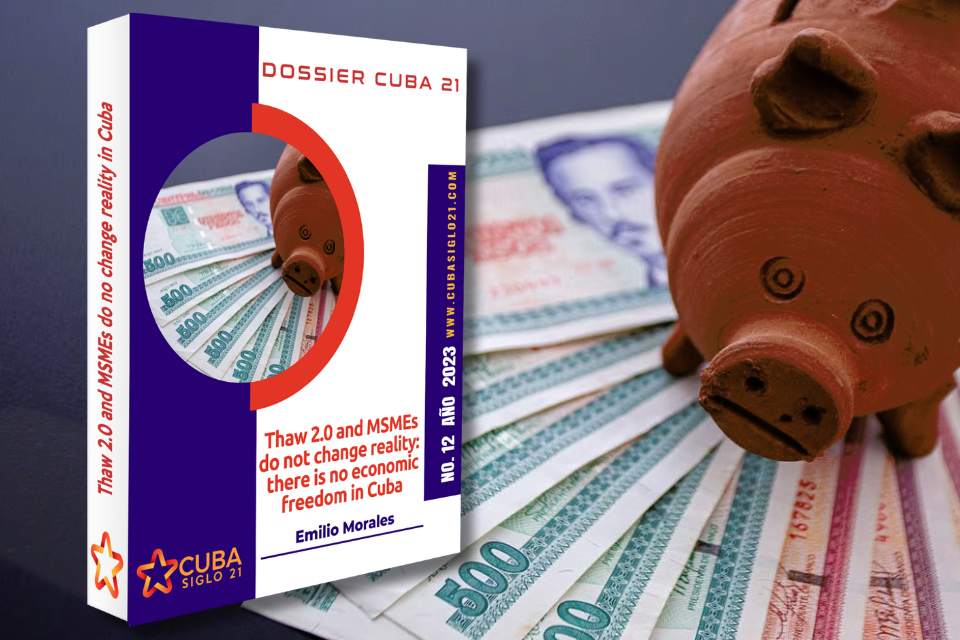Descargar Dossier completo en español
Download Dossier pdf in English
The economic situation in Cuba has been a constant topic of discussion in recent years. The approval of the Law on Micro, Small and Medium Enterprises (MSMEs) on the island generated some expectations of change and improvement in the economy. However, an analysis by Emilio Morales in Dossier No. 12 “Thaw 2.0 and MSMEs do not change reality: there is no economic freedom in Cuba” reveals that the lack of economic freedom and other restrictions in the country prevent MSMEs from being the solution to the crisis.
The recent MSME Law in Cuba has resulted in the approval of thousands of these enterprises: in two years 8,938 MSMEs. At first glance, this might appear to be a step towards economic progress. However, the restrictions imposed by the Cuban government limit the true economic freedom these businesses need to thrive.
Compared to other Latin American countries, where the survival rate of MSMEs in conditions of economic freedom exceeds 45% in the first two years, the number of MSMEs officially registered in Cuba in that period is disappointing.

To get an idea of how MSMEs behave in Latin America. The countries with the fewest are Bolivia and Panama with a little more than 50,000 each. A larger number of MSMEs corresponds to Mexico (4,170,755), Peru (2,367,735), Colombia (1,605,481), Dominican Republic (1,400,000) and Chile (990,532). The rest have an average between 147,000 and 880,000.
On the other hand, the decision to emigrate has far outweighed the decision to start a business under the MSME Law, which demonstrates the disenchantment of the Cuban people with this option. Faced with the dilemma that Cubans face today – emigration or starting a business under the new MSME Law – as options to start over, the decision to emigrate has overwhelmingly prevailed. More than half a million have already arrived in the U.S. and another million and a half are estimated to be waiting for humanitarian parole.

The document calls attention to the fact that many of the aspirations expressed this October by some of the Miami-based micro-entrepreneurs coincided with the demands of Cuba Siglo 21 presented before the United Nations Human Rights Commission in Geneva.
Cuba Siglo 21 considers that five basic freedoms are required for a genuine development of the private sector in Cuba: the right of all Cubans to register and operate businesses freely, non-discrimination in the registration and operation of businesses, the right to fully decide on the management and projection of the company and its finances, the right to import and export directly, and the right to free expression and association. Cuba Siglo 21 also stressed the need for the creation of independent economic courts without state meddling as another condition for private entrepreneurship to be able to progress.
Morales warns that a new thaw, which he baptizes as Thaw 2.0, is not a solution to the multi-systemic crisis suffered by the island. Since the first thaw promoted by Obama, the 11th of July protests in 2021 and their brutal repression, as well as the diplomatic, propaganda and now, to top it all, military alignment with Russia in its aggression against Ukraine took place. In addition, traces appeared again and again of the interference of Cuban intelligence officers to transform social unrest and protests into violent urban actions to destabilize the governments of several Latin American countries.
The Dossier concludes that the road to the development of a genuine private sector in Cuba requires significant changes in government policies. Without these basic economic freedoms and rights, MSMEs in Cuba cannot be the solution to the country’s economic crisis. The survival of the Cuban regime hangs in the balance, and any change must include the promotion of economic freedom and fundamental rights for Cuban citizens.
The main obstacle to prosperity in Cuba is not the exogenous sanctions, but the internal blockade imposed by the regime on its citizens. In particular the mental blockade of the oligarchs who control the country, who have not understood that their time has passed, and that for the country to function, for capital to flow and for the economy and the population to prosper, democracy is needed.
The five basic freedoms that the Cuban private sector needs
The Cuba Siglo 21 association affirms that the absence of economic freedom and the basic rights associated with it block the establishment of a genuine private sector and the prosperity of the country. These basic rights associated with the exercise of economic freedom are the following:
1- Right to register and operate businesses freely and independently. Entrepreneurs need to be able to register businesses directly, without authorization from intermediaries. The full freedom of every citizen to move in or out of the country must be respected to manage or work in these enterprises.
2- The right of every citizen not to be discriminated against to register, own, and operate a private business. This includes discrimination based on race, gender, sexual orientation, current place or country of residence, political ideology, or religious beliefs.
3- The right to freely decide on the management and projection of the company (size and magnitude of the investment, sector in which it will invest, pricing, selection of partners and workers, etc.).
4- Right to import and export products, services, and inputs directly.
5- The right of businessmen, private farmers, and workers -whether urban or rural- as well as all citizens, to exercise free speech and association and to be heard by special independent courts to resolve possible commercial and labor disputes.
Today, citizen enterprises in Cuba do not enjoy these freedoms and rights, so they cannot be considered genuine independent private managers and cannot unleash their full potential for social and economic benefits.
On the other hand, in Cuba, social investments in education, health, guaranteeing the basic food basket as well as energy, water and transportation services have been minimized. In the first half of 2023, the Cuban government allocated a quarter of the country’s total investment to the business and real estate services sector (hotels). While it dedicated only 10% of the amount destined to that sector to agriculture and livestock, as well as 5% to education, as well as in the health sector. This clearly demonstrates the new policy of social neglect.
Without liberating the productive forces, vertiginous inflation has been unleashed that has thrown more than half of the population into precariousness and misery. Today the average wage is less than $17 USD. A genuine private sector could contain and begin to alleviate this situation. But without genuine economic freedom it will not be able to do so.
The release of political prisoners together with the full restoration of economic freedom and the rights associated with its exercise (including freedoms of thought, expression, and association) could, at least, be a first step – certainly not the last – towards the real goal: an open and prosperous society, governed by a democratic rule of law and a free economy.
Today, citizen entrepreneurship in Cuba does not enjoy these freedoms and rights, so it cannot be considered a genuine and independent private sector, nor can it unleash its full potential for social and economic benefits. Until at least these five basic freedoms are fulfilled in Cuba, any attempt to consider the development of a genuine private sector will be a futile effort.
Descargar Dossier completo en español
Download Dossier pdf in English
Cover Photo El Toque







